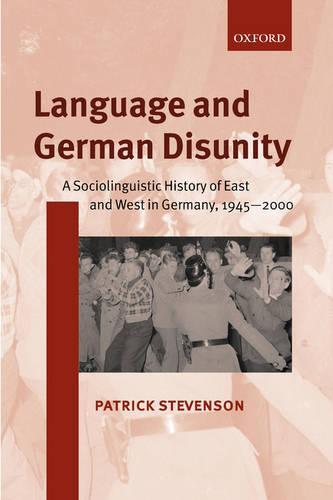Overview
This title investigates the history of national disunity in Germany since the end of World War II from a linguistic perspective. It asks: what was the role of language in the ideological conflicts of the Cold War and in the difficult process of rebuilding the German nation after 1990? In the first part of the book, Patrick Stevenson explores the ways in which the idea of ""the national language"" contributed to the political tensions between the two German states and to the different social experiences of their citizens. He begins by showing how the modern linguistic conflict between east and west in Germany has its roots in a long tradition of debates on the relationship between language and national identity. He then describes the use of linguistic strategies to reinforce the development of a socialist state in the GDR and argues that they ultimately contributed to its demise. The second part considers the social and linguistic consequences of unification.
Full Product Details
Author: Patrick Stevenson (, University of Southampton)
Publisher: Oxford University Press
Imprint: Oxford University Press
Dimensions:
Width: 16.20cm
, Height: 2.10cm
, Length: 24.10cm
Weight: 0.546kg
ISBN: 9780198299691
ISBN 10: 0198299699
Pages: 288
Publication Date: 12 December 2002
Audience:
Professional and scholarly
,
Professional & Vocational
Format: Hardback
Publisher's Status: Active
Availability: To order

Stock availability from the supplier is unknown. We will order it for you and ship this item to you once it is received by us.
Reviews
Patrick Stevenson's fascinating and highly readable study...goes beyond most existing linguistic and sociolinguistic research ... The author hopes that his book will appeal to sociolinguistics, historians, sociologists, and political scientists, and indeed it will. Ingeborg Walther, The German Quarterly ... provides a well-written and well-argued overview of a substantial body of research on east-west sociolinguistic divergence and re-convergence in post-war Germany, which has so far been published almost exclusively in German. Journal of Multilingual and Multicultural Development Stevenson relies largely upon the research of others but his expert summaries, selections of examples and methodological commentaries make the book an authoritative one. Journal of Multilingual and Multicultural Development ... outstanding new book ... Stevenson is right at the forefront of thinking in sociolinguistics and the cognate field of linguistic anthropology ... The task, so admirably fulfilled here, is to elucidate such indexicality vis-a-vis one of the key political and historical periods of the last century: the division an unification of Germany. Journal of Sociolinguistics ... outstanding book ... [Stevenson's] book explores language in a way that interfaces with recent social, cultural and political theory, his analyses capture throughout the inherently indexical nature of language as manifest in, and through, communicative practice. Times Higher Education Supplement This book is ideal for not only the students of socio-linguistics but for everyone who is interested in studying language politics and understanding a linguistic fact as a political act. Linguist List
Patrick Stevenson's fascinating and highly readable study...goes beyond most existing linguistic and sociolinguistic research ... The author hopes that his book will appeal to sociolinguistics, historians, sociologists, and political scientists, and indeed it will. Ingeborg Walther, The German Quarterly ... provides a well-written and well-argued overview of a substantial body of research on east-west sociolinguistic divergence and re-convergence in post-war Germany, which has so far been published almost exclusively in German. Journal of Multilingual and Multicultural Development Stevenson relies largely upon the research of others but his expert summaries, selections of examples and methodological commentaries make the book an authoritative one. Journal of Multilingual and Multicultural Development ... outstanding new book ... Stevenson is right at the forefront of thinking in sociolinguistics and the cognate field of linguistic anthropology ... The task, so admirably fulfilled here, is to elucidate such indexicality vis-a-vis one of the key political and historical periods of the last century: the division an unification of Germany. Journal of Sociolinguistics ... outstanding book ... [Stevenson's] book explores language in a way that interfaces with recent social, cultural and political theory, his analyses capture throughout the inherently indexical nature of language as manifest in, and through, communicative practice. Times Higher Education Supplement This book is ideal for not only the students of socio-linguistics but for everyone who is interested in studying language politics and understanding a linguistic fact as a political act. Linguist List
Author Information
Patrick Stevenson studied at the Universities of Oxford, Sussex and Reading. He is currently Reader in German and Head of German Studies at the University of Southampton. He has published widely on many aspects of German sociolinguistics.




